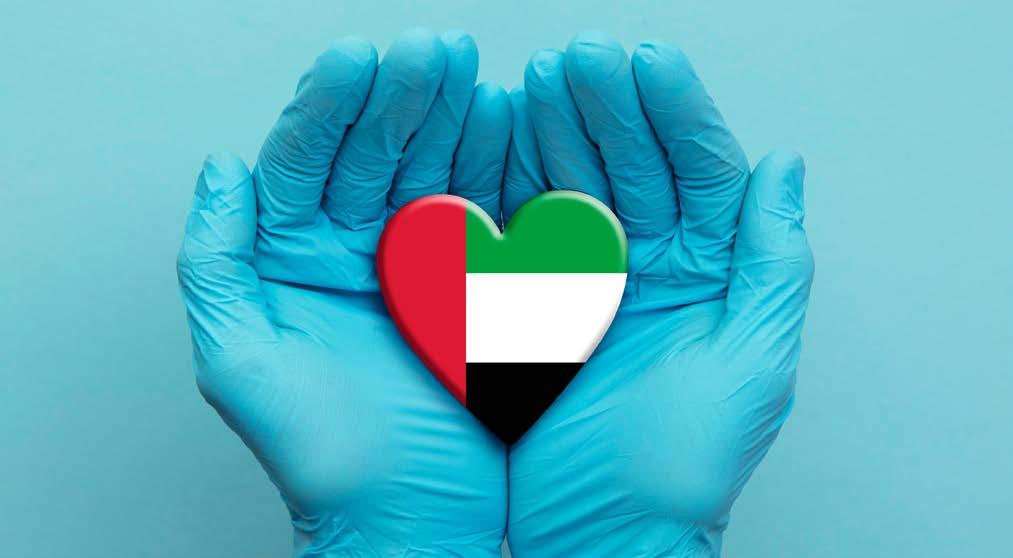
4 minute read
UAE's aspirations to become a leading medical hub
Investments in technology, infrastructure, and human capital
By Lana Zailaa
Advertisement
The United Arab Emirates has swiftly emerged as a premier medical hub on the global stage, attracting patients and medical professionals from all over the world. The country has secured this position through its noteworthy investments in technology, infrastructure, and human capital, elevating it to an unparalleled level of medical care.

The UAE’s cutting-edge infrastructure is a major factor that distinguishes it as a medical hub. The country has made substantial investments in constructing contemporary hospitals, clinics, and research centers that are equipped with state-of-the-art technology, such as advanced imaging equipment, robotic surgery systems, and electronic health records. These facilities enable the provision of high-quality healthcare services to patients from all over the world. The healthcare infrastructure in the UAE is constantly growing, with new hospitals and clinics being constructed in various areas.
The UAE has made significant investments in human capital to establish itself as a premier medical destination. The country boasts a pool of highly trained healthcare professionals, including doctors, nurses, and other skilled workers. Moreover, the UAE is actively seeking to attract top-notch medical specialists from different corners of the globe to work in its hospitals and clinics. This strategy has resulted in an expansion of healthcare services and an elevation in the quality of care delivered to patients. The country’s investments in technology have also been instrumental in making it a leading medical hub. In fact, the UAE has adopted advanced tools such as telemedicine, electronic health records, and robotics in the field of medicine. Through telemedicine, patients can access remote consultation and diagnosis, particularly benefiting those who reside in remote areas or have mobility issues. The use of telemedicine has been integrated into both public and private hospitals, with the Ministry of Health and
Prevention (MOHAP) launching a telemedicine platform in 2019 to facilitate remote communication between patients and doctors.
The implementation of Electronic Health Records (EHRs) has revolutionized patient records management in healthcare. EHRs have made it simpler for healthcare professionals to access and share patient data, resulting in improved healthcare efficiency and reduced errors. The UAE has successfully introduced EHRs in both public and private hospitals.
The integration of robots in the medical field is also a notable technological advancement in the UAE. They are utilized in surgical procedures, patient care, and administrative tasks. The Sheikh Khalifa Medical City in Abu Dhabi, for example, employs robots to aid in the rehabilitation of patients and take vital signs, among other tasks.
Genomics is another area where the UAE is making significant investments. The country has established the Sheikh Khalifa Medical City Genomic Medicine Institute, which aims to enhance the detection and management of genetic disorders. The institute uses cutting-edge technology, such as next-generation sequencing, to gain deeper insights into genetic ailments and create innovative treatments. The institute collaborates with leading international research institutions to provide patients with access to the latest therapies and clinical trials.
The UAE is making significant strides in the field of healthcare with the help of Artificial Intelligence (AI) and Machine Learning (ML). The country has created the UAE AI and ML in Healthcare Conference to encourage the integration of AI and ML in medicine. This event brings together specialists in the field to exchange insights on the latest advancements and discover new ways to leverage AI and ML to enhance healthcare. AI and ML are currently being utilized to refine disease diagnosis, treatment, and the development of novel drugs and therapies. The UAE is among the leading countries worldwide in adopting AI technology in healthcare.
The UAE’s ambition to emerge as a leading medical hub has resulted in the establishment of several technology parks and zones, such as the Sharjah Research, Technology, & Innovation Park (SRTIP) and Dubai Science Park. These zones and parks offer an array of facilities and resources for start-ups, research centers, and technology companies operating in the medical sector. They create an environment conducive to innovation and collaboration, promoting the creation of cutting-edge medical technologies and solutions.
As a leading innovation and research hub, SRTIP has made significant contributions to the life sciences, health, and wellness industry in the UAE. With advanced facilities and a strong commitment to promoting collaboration between academia and industry, SRTIP has successfully introduced ground-breaking medical technologies and solutions to the UAE market.
Dubai Science Park is dedicated to advancing scientific research and innovation across a wide range of industries, with a particular emphasis on healthcare. It provides laboratories, office spaces, and other facilities to support research and development in the healthcare industry. The growth of the healthcare industry in the UAE is being supported not only by the Dubai Science Park and the Sharjah Research, Technology, & Innovation Park but also by various other institutions.
The Abu Dhabi Health Services Company (SEHA), for example, oversees and runs public hospitals and clinics in Abu Dhabi, while the Khalifa University of Science and Technology has set up a research center solely dedicated to the advancement of medical technologies.

The Dubai Healthcare City (DHCC), on the other hand, operates as a hub for medical professionals by providing training, education, and research opportunities. These institutions have established a conducive environment for innovation and expansion in the healthcare sector, further cementing the UAE’s position as the premier destination for medical technology and healthcare services in the region. The UAE’s remarkable strides in healthcare have left many in awe, particularly given the country’s relatively young age. Within a few short decades, the UAE has emerged as a prominent medical hub, a testament to its visionary leadership and adaptability. Going forward, healthcare will remain a top priority in the UAE’s ambitious plans for the future. The country’s sustained efforts to improve its healthcare industry have the potential to establish it as a major player on the global healthcare stage, contributing to the betterment of global health and well-being.
Clearly, the UAE’s journey to becoming a leading medical hub is well underway, as evidenced by its impressive goals and unwavering commitment to progress in healthcare.











